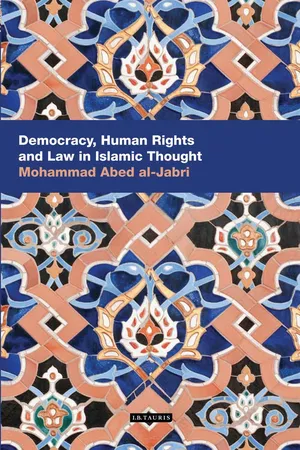
- 264 pages
- English
- ePUB (mobile friendly)
- Available on iOS & Android
Democracy, Human Rights and Law in Islamic Thought
About This Book
Throughout the Middle East, and in the west as well, there has been much discussion concerning the notion of Islamic rule and the application of shari'ah by the state. Central to these debates are the three key themes that Mohammad Abed al-Jabri looks at in this book: democracy, human rights and law. Jabri, one of the most influential political philosophers in the contemporary Middle East, examines how these three concepts have been applied in the history of the Arab world, and shows that they are determined by political and social context, not by Islamic doctrine. Jabri argues that in order to develop democratic societies in which human rights are respected, the Arab world cannot simply rely on old texts and traditions. Nor can it import democratic models from the West. Instead, he says, a new tradition will have to be forged by today's Arabs themselves, on their own terms. Through analysis of contemporary Arab ideology, its doubts about democracy, whether human rights are universal and the role of women and minorities in Islamic society, he expounds on the most pertinent issues in modern political philosophy. This lively interrogation of the building blocs of western conceptions of a modern state is a classic text and is vital for all students of modern Islamic political thought.
Frequently asked questions
Information
VOLUME I
RELIGION, STATE AND THE APPLICATION OF ISLAMIC SHARĪʿAH
Introduction
Table of contents
- Cover
- About the Author
- Title Page
- Copyright Page
- Contents
- VOLUME I: RELIGION, STATE AND THE APPLICATION OF ISLAMIC SHARĪʿAH
- Introduction
- Part One: The Question of Religion and the State
- 1 Religion and the State in the Authoritative Cultural Referent
- 2 Religion and State in the Renaissance Authoritative Referent
- 3 Religion, Politics and Civil War
- Part Two: The Question of Applying al-Sharīʿah
- 4 Awakening and Renewal
- 5 Traditionalism (al-salafīyah)...or The Historical Experience of the Nation?
- 6 Extremism: Right and Left
- 7 Extremism Between Creed and al-Sharīʿah
- 8 For the Procession of Ijtihād
- 9 The Rationality of the Rulings of al-Sharīʿah
- 10 Rulings and Dependence
- 11 Every Age has its Special Needs
- 12 ‘Avoid the Ḥudūd Penalties when in Doubt’
- 13 Concerning ‘Complete Application of al-Sharīʿah’
- VOLUME II: DEMOCRACY AND HUMAN RIGHTS
- Introduction
- Part One: Democracy: Its Historical Role in the Arab World
- 1 A Demand in the Arab World
- 2 Al-Shūrā and Democracy are not One and the Same
- 3 The Difficult Birth
- 4 Partnership in Human Governance
- 5 Democracy and the Right to Speak
- 6 No Way Out Except Through a Historical Bloc
- Part Two: Democracy and the Current Arab Reality
- 7 The Problem of the Transition to Democracy
- 8 Objective Situations Conducive to Democracy
- 9 Contemporary Arab Ideology and its Doubts about Democracy
- 10 Dispersing the Doubts about Democracy
- 11 The State that Swallows up Society
- 12 Civil Society and the Elites in the Arab Nation
- 13 Elites Fear Democracy
- 14 Democracy, a Necessity
- Part Three: Cultural Implantation of Human Rights in the Contemporary Arab Conscience
- 15 Human Rights: Particularity and Universality
- 16 Universality of Human Rights in the European Point of Reference
- 17 Universality of Human Rights in the Islamic Authoritative Point of Reference: Reason and Innate Nature
- 18 The Universality of Human Rights in the Islamic Authoritative Point of Reference: Covenant and al-Shūrā
- 19 Philosophy of Human Rights and Religion
- 20 Freedom is One Thing, Apostasy Another
- 21 Women’s Rights in Islam: Between the Fundamental Principles of al-Sharīʿah and its Particular Rulings
- Part Four: Enhancing Awareness of Human Rights in Islam
- 22 The Concept of the Human Being in Modern Thought
- 23 The Concept of the Human Being in the Qurʾān
- 24 The Right to Life and its Enjoyment
- 25 The Right to Freedom of Belief, Knowledge and Difference
- 26 Al-Shūrā between the Qurʾān and the Circumstantial Interpretations
- 27 The Right to Equality and the Question of ‘Preference’
- 28 Slavery and the Rights of Women
- 29 The Right to Justice: The Strength of the Qurʾānic Text and the Vacillation of the ‘Advisory Discourse’
- 30 The Rights of the Weak Oppressed: The Right of the Poor to the Wealth of the Rich
- 31 Social Security in Islam: Necessity of Development
- 32 The Rights of God, the Rights of People: Application of al-Sharīʿah
- Notes